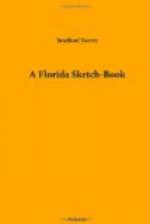On two sides of me, beyond the orange-trees, is a thicket of small oaks and cabbage palmettos,—hammock, I suppose it is called. In all other directions are the pine-woods, with their undergrowth of saw palmetto. The cardinal sings from the hammock, and so does the Carolina wren. The chewinks, the blackbirds (a grackle just now flies over, and a fish-hawk, also), with the bluebirds and the pine warblers, are in the pinery. From the same place comes the song of a Maryland yellow-throat. There, too, the hen-hawks are screaming.
At my feet are blue violets and white houstonia. Vines, thinly covered with fresh leaves, straggle over the walls,—Virginia creeper, poison ivy, grapevine, and at least one other, the name of which I do not know. A clump of tall blackberry vines is full of white blossoms, “bramble roses faint and pale,” and in one corner is a tuft of scarlet blooms,—sage, perhaps, or something akin to it. For the moment I feel no curiosity. But withal the place is unkempt, as becomes a ruin. “Winter’s ragged hand” has been rather heavy upon it. Withered palmetto leaves and leaf-stalks litter the ground, and of course, being in Florida, there is no lack of orange-peel lying about. Ever since I entered the State a new Scrip-ture text has been running in my head: In the place where the orange-peel falleth, there shall it lie.
The mill, as I said, is now the centre of an orange grove. There must be hundreds of trees. All of them are small, but the greater part are already dead, and the rest are dying. Those nearest the walls are fullest of leaves, as if the walls somehow gave them protection. The forest is creeping into the inclosure. Here and there the graceful palm-like tassel of a young long-leaved pine rises above the tall winter-killed grass. It is not the worst thing about the world that it tends to run wild.
Now the quail sings again, this time in two notes, and now the hummer is again in the orange-tree. And all the while the redbird whistles in the shrubbery. He feels the beauty of the day. If I were a bird, I would sing with him. From far away comes the chant of a pine-wood sparrow. I can just hear it.
This is a place for dreams and quietness. Nothing else seems worth the having. Let us feel no more the fever of life. Surely they are the wise who seek Nirvana; who insist not upon themselves, but wait absorption —reabsorption—into the infinite. The dead have the better part. I think of the stirring, adventurous man who built these walls and dug these canals. His life was full of action, full of journeyings and fightings. Now he is at peace, and his works do follow him—into the land of forgetfulness. Blessed are the dead. Blessed, too, are the bees, the birds, the butterflies, and the lizards. Next to the dead, perhaps, they are happy. And I also am happy, for I too am under the spell. To me also the sun and the air are sweet, and I too, for to-day at least, am careless of the world and all its doings.




